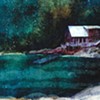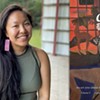Published September 6, 1995 at 10:00 a.m. | Updated October 3, 2015 at 9:18 a.m.
She was picking up a small stack of four ones — four ones she'd been monitoring for 20 or 30 minutes, trying to tell if they were tip or barchange — when it began again, the need. Four clean dollars in a pile didn't come along all that often, and as soon as it was clearly left, clearly waiting, she took it with her left hand while looking the other way. She was only looking the other way out of some vestigial modesty. But the hand with the money accidentally brushed a hurricane glass, long and fluted, and it shattered quietly into the ice bin. It was a piña colada. There was no color, even, to telegraph the fragments. It all gleamed up at her, some of it harmless and some of it, maybe, not.
Alison picked the big pieces out, all she could see, and when she'd done so, she brushed damp hair off her forehead with the back of her hand and looked around. Nobody'd seen. It was a Tuesday, and the few people in the bar were caught up in their own trite, individual addictions: sipping gin, shooting pool, darts, searching robotically, vainly for available women in the nearly all-male crowd. Tuesday was almost always addicts only. She glanced at the pool table toward Maurice, and he was there making friends, oblivious.
So she kept pouring drinks, something she'd never done before. The bin had to be emptied, wiped down and refilled if you broke a glass in it. That was gospel. Now every time she filled a glass with ice and made a drink she felt like the psychopath in a Hitchcock film. People accepted the drinks from her hand. "Thanks a lot," they said.
"Alcohol's a poison anyway," she told one guy out of the blue as she handed him a Chivas and Coke. "I should be giving away rusty nails for swizzle sticks. It's not like it really makes it any more dangerous."
He looked her over. He didn't even bother to ask what she meant. "I'll keep that in mind," he said. He looked around mechanically. "What's your name?" he asked.
"Watch your ice," Alison said, smiling, pointing down into the amber liquid. He took a sip, showing her his dimple. She knew what he was going to say before he'd put it together himself. "Okay, Watch-Your- Ice," the guy said, "whatever you say."
Finally, though, she couldn't keep going with it. It was too random. There was an idiocy and a lunacy to it, and she dumped the bin in the alley behind the Metronome, wiped it down and made the four trips with the ice bucket that it took to refill it. She got back the five glasses she'd poured with the old ice by offering the people fresh drinks.
But all of it touched off something particular inside of her. It was a need to cause change. It was disgust with the sameness, the smugness of the small city, which, because it was the largest and the most liberal in the empty state, was unaware of its own bloodlessness and mediocrity. It was an urge to smear the air with what was wrong. She was gracious enough, in some part of her, to see these feelings — when they cropped up every six months or so — as an unexpected inheritance from her mother, but in Alison's mind they were also precisely what set the two of them apart, in addition to life and death. Alison did; her mother had never done.
By the time she left the Metronome, at a little after 3 a.m., the need had swelled to include everything she saw walking home. Classical music was still playing from overhead speakers; it drizzled down on the heads of the few panhandlers standing and stamping under the neat awnings of shops. She found herself wondering where the main stereo system for the mall was located, how to get at it.
On Pearl Street, she passed Pearl's, the city's only true gay bar. It was a standard, two-story white frame building with shuttered windows, discreet. Two women came out the door, turned and came up the street toward her. They were hand in hand, maybe 20 or 21, heads cropped very close and with blazers and hiking boots. Alison could hardly believe them, the daring anomaly of them in the quiet little street.
"Right on," she said to them as they passed her. They turned and one of them smiled quizzically, put a hand on top of her dyed-black hair.
"What'd you say?"
"You guys are excellent," Alison said, walking backward in the dark.
"We know," the other woman said.
"But thanks," the first one put in before turning around.
Burlington was the dream of the white village. White people moved through the streets in small, pale groupings, families and day-tourists from Montréal and knots of children who knew one another from school. Everyone was clean. Everyone seemed to wear glasses and neat khaki pants, pressed skirts. Everyone looked smart and rich.
And on the upper end of Church Street — the brick-and-cobblestone pedestrian mall, politely closed to traffic — stood a white church with a steeple that rose up into the blue sky like the hugest, boldest, most sterile middle finger Alison had ever seen. Some days as she was walking up the mall she would just look around her at the people shopping and the young kids clumsily smoking cigarettes on the laquered green benches. She would just marvel that they couldn't see it. It was a "fuck you" that was too big and too fundamental for them to see. All the outlying villages — Milton, Jericho, Richmond — had their steeples, but not like Burlington. When the stereo-enhanced bells went off at noon, Alison could hear them from her apartment window, down Pearl Street, almost to the lake. Eight tones, four descending, then the same four ascending in reverse. Every day, every day. She heard it in words as well as tones: Our — Town — Shut — Up; Shut — Up — Our — Town.
It was the dream of the white village, and it had been her mother's dream, too. Before her death, Alison's mother had been a fairly widely published poet (or "poetess," as she insisted her flyers read). She was known for most of her adult life as Vermont's second-most famous female poet, and the fact that she was being lovingly and firmly shoved into line behind all of the male poets and a woman who wrote nothing but tepid nature verse seemed never to bother her at all. She had a small gazebo out behind their old house where she sat for hours in the summer, writing.
By the time she died she had the face that some middle-aged white women get: pasty, doughlike, as though life had taken the tanned, sharp young woman in Alison's baby photos and methodically unbaked her. One Sunday morning when Alison was 6, 10 years before the death, her mother had woken her gently. The room was cold and dark. It was 4:15 in the morning. "Get up," her mother whispered. "Quick. Don't be scared, little baby. It's all right. But get up. Don't think. We have to go catch someone."
Alison pulled on clothes, complaining in a hushed, whiney voice. Her mother stood at the doorway, in the square of light, clicking her tongue. "He's only there for another half-hour," she said in a lilting voice, "then he flies off home. You're gonna miss him because you're such a slow shoe tier."
They parked the car beside the VFW building and walked a block to Church Street. Her mother looked up and down the length of it. "Nope. We missed that part. He's down by Main Street by now." She had Alison's hand and she swung her arm, as though they were on a holiday. "You are just gonna love him. He's just beautiful," she whispered.
They walked down the mall under the streetlights, between the rows of expensive shops, which even at 6 had seemed to Alison designed for people other than her and her mother. As they passed Bank Street, her mother glanced left, then pulled up short. She caught her breath and swung Alison around.
"There he is," she said softly.
Alison looked, saw nothing until her mother pointed to it. It was a street sweeper, a large green tank of metal with twin iron forks extending from the cab like tusks. Circular brushes were moving underneath it, noisily, just barely visible. A small side light threw a careful spot of illumination at the point where the revolving brush met the gutter. Alison just stood there in the dark. Her mother walked her closer. "Look at that man," she said over the swishing noise and the diesel exhaust.
Alison looked at the driver, a large man with white hair and glasses. He was leaned way over, watching the spot of light, driving by watching his brush and the curb. He might have been ice fishing, sitting blandly over a hole in the ice, for all the enthusiasm she could see. Occasionally he'd lift his head, check his bearings, and then lean over the lighted gutter again. Once she saw him spit on the street. Gum wrappers and cigarette butts blurred with the coming of the brush, vanished.
Alison's mother looked at Alison. She shook her head, almost at a loss for words. "Every time I see him I can't believe him," she said.
A poem came out of it, one drafted that very morning when they got back to the house. All of Alison's complaints her mother turned into apostrophe, to the early hour, to the humble machine, to the driver with the bleak, diamond cutter's eye. "The Clean Streets" appeared in a prominent national journal under both of their names. It was the first of five or six things for which Alison would never forgive her.
("Alison" was excerpted from The Dream of the White Village, and reprinted from the novella-length excerpt appearing in the Spring 1995 New England Review.)
LOCAL LIT 101
Before Philip Baruth moved to Vermont nearly three years ago, his impressions of the state were based on childhood camp memories and winter wonderland song lyrics. Arson at the Vermont CARES office did not jiye with his pristine preconceptions. This year the 33-year-old assistant professor of English at the University of Vermont seeks to publish his second book, The Dream of the White Village, whose lead character witnesses the flames from that fire (disguised only slightly in fiction) as he approaches Burlington on the ferry. "It's kind of a story about a guy who moves to town and gets mixed up with a group of vaguely white supremacists, versus the group ofpeople that that group despises," he says. Baruths view of his adopted city is slightly tainted, but he insists the "Burlington presented in the book is not all bad."
Unlike his first novel published last year — The Millenium Shows (Albion), based on a fictionalized Grateful Dead-like band — Baruths new book is constructed as interconnected short stories in which certain characters recur. His references to real Burlington spots, like Club Metronome, make it an "insider" read for locals — or students temporarily inhabiting the city. To some of the latter, Baruth is known as that cool young prof in the English department who teaches advanced fiction writing, publishing and introduction to lit. Last year, he garnered a Black Warrior Review literature award for a story about a character with a heart the size of a pea.
Not everyone knows he's way into the autobiographies of people now dead 200 years. Next semester he'll be on leave to write a book about an 18th-century "strolling actress" who lived much of her life as a man. Meanwhile, his message for students: that "their own responses to literature matter very much, but are in need of continuous investigation." In other words, keep on reading.
–Pamela Polston
More By This Author
Speaking of...
-

The Distant Snowy Mountain: a Short Story
Dec 20, 2023 -

Former Vermont Gubernatorial Candidate Bruce Lisman’s American Literature Collection Fetches Millions at Auction
Jun 23, 2023 -

Bennington Review Wins Prestigious Literary Prize
Jul 15, 2022 -

Fiction: Concerning the
LossTriumph of the 'VSS Conquest'Dec 22, 2021 -

Well-Read Vermont Chefs Share Their Favorite Fictional Meals
Dec 21, 2021 - More »
Comments
Comments are closed.
From 2014-2020, Seven Days allowed readers to comment on all stories posted on our website. While we've appreciated the suggestions and insights, right now Seven Days is prioritizing our core mission — producing high-quality, responsible local journalism — over moderating online debates between readers.
To criticize, correct or praise our reporting, please send us a letter to the editor or send us a tip. We’ll check it out and report the results.
Online comments may return when we have better tech tools for managing them. Thanks for reading.










































